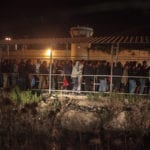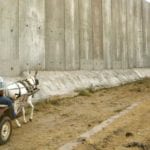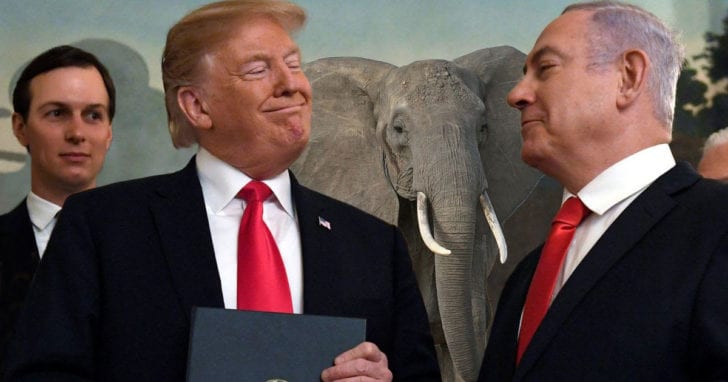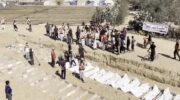Is there peace in the Peace Plan? Senior advisor and son-in-law of the President Jared Kushner (left), US President Donald Trump second from left, Israeli PM Benjamin Netanyahu (far right) are always accompanied by their shared comfort animal, the elephant in the room (second from right). (Photoshop collage by If Americans Knew.)
The Trump-Kushner “Peace” Plan is slick and businesslike, with an aura of objectivity and balance – but it is exactly the opposite, and something about it stinks.
by Kathryn Shihadah
There is a giant herd of elephants circling the Trump-Kushner Peace Plan, and they’re not going away. The fragrance of pachyderms is unmistakable, but Trump administration, the Netanyahu government, and Israel partisans have decades of experience in ignoring whatever is inconvenient to their agendas.
That unmistakable throng of elephants is the disenfranchisement and subjugation of the Palestinian people that has gone for a hundred years, and is presently so flagrant that numerous human rights organizations and experts have called it apartheid.
And while the Trump administration claims it wants a future of peace, this Plan will not bring peace.
Because, elephants.
 Elephants from the get-go
Elephants from the get-go
Shortly after the Plan’s release, Kushner boasted on Fox & Friends, “This is an 80 page proposal, with a map. Never been done before.” Pachyderm prints are on every page (and the map), starting with the very first sentence:
“Israelis and Palestinians have both suffered greatly from their long-standing and seemingly interminable conflict.”
To start the document with this statement is to ignore a fundamental truth: the creation of Israel – the Zionist project – wreaked havoc on the people of Palestine, and continues to do so today.
Yes, both sides have suffered, but only one side has lost its homeland, lived under decades of injustice and oppression, and is being slowly starved and poisoned.
“Since 1946, there have been close to 700 United Nations General Assembly resolutions and over 100 United Nations Security Council resolutions in connection with this conflict.”
Missing factoid: Almost every one of the 800+ resolutions (Kushner left out 45 UN Human Rights Council resolutions) connected with this conflict, was critical of Israeli policies and actions that defied international law.
“These resolutions have not brought about peace.”
The resolutions have not brought about peace because (elephant alert) Israel has defied every one of them.
 Elephants in basic assumptions: Palestinians “need” the Plan
Elephants in basic assumptions: Palestinians “need” the Plan
Blaming Palestinian resistance
“For comprehensive peace to be achieved, it is up to the Palestinian people to make clear that they reject the ideologies of destruction, terror and conflict.”
Palestinian people aren’t committed to conflict – they are committed to resistance against occupation and apartheid (resistance is legal, but occupation and apartheid are illegal). For comprehensive peace to be achieved, Israel must abandon the elephants of discrimination and violence, and adhere to international law.
Blaming Palestinian backwardness
“The economic plan will empower the Palestinian people to build the society that they have aspired to establish for generations. It will allow Palestinians to realize a better future and pursue their dreams…By developing property and contract rights, the rule of law, anti-corruption measures, capital markets, a pro-growth tax structure, and a low-tariff scheme with reduced trade barriers, this initiative envisions policy reforms coupled with strategic infrastructure investments that will improve the business environment and stimulate private-sector growth.”
This suggests that the Palestinian people have been unable to build a great society because they lack a pro-growth tax structure and other first-world, art-of-the-deal schemes. While Kushner’s words dazzle, they ignore the myriad, incessant turmoil and economic hardship created by occupation, apartheid, and blockade. Israel has initiated wars, withheld food and medicine, and traumatized generations of Palestinians.
A 2016 publication by the UN Conference on Trade and Development (UNCTAD) noted:
The relationship between the Israeli economy and that of the Occupied Palestinian Territory remains that of two dissimilar and unequal economies, whereby the large, dominant economy practices policies that keep the small economy weak and dependent…depriving the Palestinian people of their ability to produce and, in the process, cultivating a dependence on the Israeli economy and donor aid.
Without the occupation, the Palestinian economy could easily produce twice the GDP it currently generates, while the chronic trade and budget deficits, as well as poverty and unemployment, could recede and the economic dependence on Israel could end.

Blaming Palestinian ineptness/laziness
“This Vision has been developed to reduce over time the Palestinians’ dependence on aid from the international community.”
Palestinians have been aid-dependent because farmers have been restricted access to their fields, fishermen the sea, and workers their jobs; Israel has collected taxes on behalf of the Palestinian Authority (PA), and then refused to hand funds over; Israel denies access to needed medicines, building supplies, and parts to repair crucial equipment like power plants and flour mills; and Israel has often destroyed or confiscated items that were donated to the Palestinian people.
UNCTAD reported in 2019 that between 2000 and 2017, Israel’s occupation of the West Bank cost the Palestinian people approximately $47.7 billion – over $2.5 billion a year. As Israel controls agriculture (more below), exports, natural resources, and tourism, it deliberately siphons money away from the Palestinian economy and into its own coffers.
The way to reduce Palestinians’ dependence on aid is to free them from occupation and blockade so they can work and produce, instead of standing at checkpoints and fighting a system that is stacked against them.
Blaming Hamas
“Gaza has tremendous potential but is currently held hostage by…terrorist organizations committed to Israel’s destruction…[that are] fueling a war machine of thousands of rockets and missiles, dozens of terror tunnels and other lethal capabilities…Gaza is run by terrorists who provoke confrontations that lead to more destruction and suffering for the people of Gaza…
As a result of Hamas’ terror and misrule, the people of Gaza suffer from massive unemployment, widespread poverty, drastic shortages of electricity and potable water, and other problems that threaten to precipitate a wholesale humanitarian crisis.”
While Hamas’ rule leaves much to be desired, Hamas is not the cause of Gaza’s humanitarian crisis. Gaza is under a brutal blockade because its people dare to resist the de facto occupation of their land. Some militants shoot mostly-homemade rockets toward Israel in defiance – these “lethal” rockets (which began after Israeli violence) have killed about 50 Israelis in 19 years, while Israel’s army (the most powerful in the Middle East) has killed over 7,000 Gazan Palestinians in the same time period and at least 461 West Bankers and East Jerusalemites.

In the rush to demonize Hamas, Israel and its supporters (including Jared Kushner) once again disregard inconvenient facts: Hamas’ efforts are nothing more or less than resistance against oppressive, illegal Israeli policies; Hamas operations have been restrained; and – contrary to Israeli hype – its actions are not provocations but responses to Israeli provocation (not the least of which is the catastrophic blockade); Hamas has on multiple occasions offered long-term ceasefire deals, to which Israel has responded with violence; and most brokered ceasefires (79%) have been broken by Israel.
Hamas and other resistance groups’ actions have been less deadly than Israel’s by a large margin. Witness these statistics from Israeli human rights organization, B’Tselem:
“Peacetime,” Sept 2000 – Dec 2008
- 136 Israelis killed (14 by rockets)
- 3,000 Gazans killed
Israeli incursion into Gaza, 2008-9 (“to stop rockets”)
- 9 Israelis killed (4 by rockets)
- 1400 Palestinians killed
“Peacetime,” 2009-2012
- 3 Israelis killed (by rockets)
- 291 Palestinians killed
Israeli incursion into Gaza, 2012 (“to stop rockets”)
- 6 Israelis killed (by rockets)
- 174 Palestinians killed
“Peacetime,” 2012-14
- 1 Israeli killed (not by a rocket)
- 27 Palestinians killed
Israeli incursion into Gaza, 2014 (“to stop rockets”)
- 72 Israelis killed (17 by rockets)
- 2,200 Palestinians killed
Gaza/Israel since 2014
- 5 Israelis killed (1 by Gazan sniper, 4 by rockets)
- over 400 Gazans killed (most by Israeli snipers)
It is perhaps not surprising that multiple human rights organizations have placed the blame for the humanitarian crisis squarely on Israel’s shoulders.
For a Timeline of deaths in the conflict go here.
 Elephants in basic expectations of the “Peace” Plan
Elephants in basic expectations of the “Peace” Plan
Basic expectations of the Kushner Plan are unsound, blatantly partisan, and tell only the convenient parts of the story:
There will be no population transfer
“Peace should not demand the uprooting of people – Arab or Jew – from their homes. Such a construct, which is more likely to lead to civil unrest, runs counter to the idea of co-existence.”
This is a handy position to take after Israel has illegally transferred 600,000 Jews onto West Bank and East Jerusalem land stolen from Palestinians. “No population transfer” would have been a useful policy in 1948, to stop the Zionist army from depopulating hundreds of Palestinian villages and exiling 750,000 Palestinians, and then refusing to allow them to return. Transfer of population into occupied territory has been against international law since the Fourth Geneva Convention was ratified in 1949.
The transfer of Israeli Jews from their settlements back to Israel (also stolen) no doubt would cause “civil unrest,” but it was a grave error to position them in someone else’s land to begin with.
As an aside, when Palestinians participated in civil unrest circa 1939, protesting British rule and the population transfer of Jews into Palestine, they were brutally suppressed. In 1987, Israeli soldiers employed “force, might, and beatings,” in addition to live ammunition to subdue unarmed demonstrations against the occupation. The Great March of Return in Gaza, a massive and ongoing peaceful protest, has been answered with sniper fire. When Palestinians are the ones with grievances, no attempt is made to appease and avoid civil unrest.

Israel will sacrifice historical claims
“This Vision provides for the transfer of sizable territory by the State of Israel [to the Palestinians] – territory to which Israel has asserted valid legal and historical claims, and which are part of the ancestral homeland of the Jewish people — which must be considered a significant concession.”
This statement completely ignores Palestinians’ legal and historical claims to the land – their ancestral homeland. And while the claim of Jewish Israelis is based on a religious document and a short-lived mini kingdom 3,000 years ago, Palestinians have lived on the land recently enough to have Ottoman-era ownership records and deeds. Meanwhile, Israel controls all of the land. A large number of Palestinians have expressed willingness to settle for just 22% of what was once theirs. Is this not a significant concession on the part of Palestinians?
Of course, resolving a problem with these complexities isn’t easy, but no resolution will be valid when the arbiter is disingenuous.
Normalization as a starting point
“Since the moment of its establishment, the State of Israel has not known a single day of peace with all of its neighbors…The United States will strongly encourage Arab countries to begin to normalize their relations with the State of Israel…These countries are expected to end any boycott of the State of Israel and oppose the Boycott, Divestment, and Sanctions (commonly referred to as BDS) movement and any other effort to boycott the State of Israel.”
The statement that “Israel has not known a single day of peace with all of its neighbors” provokes another elephant alert: Israel started or caused its wars (Israel launched the Six Day War, the 1973 war was waged by countries trying to regain land that Israel had unlawfully taken over, and Israel has invaded Lebanon several times). In addition, both Jordan and Egypt recognized Israel long ago.
Ordering Arab neighbors to normalize relations with Israel in the current environment overlooks the legitimate reasons for the global BDS movement: Israel’s noncompliance with international law (not anti-Semitism).
Conflict with Israel’s neighbors was inevitable since the state was created on land belonging to another people group, who were pushed out to become a burden on their neighbors.
First Israel must make the appropriate changes. Then its neighbors – and the world – may consider normalizing relations.
 Elephants in the education plan
Elephants in the education plan
“The [education] initiative will empower the Palestinian people to realize their ambitions. Through new data-driven, outcomes-based education options at home, expanded online education platforms, increased vocational and technical training… students can fulfill their academic goals and be prepared for the workforce.”
Again, the Trump-Kushner plan neglects the true reason why Palestinians can’t “realize their ambitions.” Under occupation, students often can’t get past checkpoints in time for classes; school days are regularly interrupted by Israeli military tear gas attacks or invasions, followed by arrests of students and/or teachers; a huge number of students have been traumatized by Israeli violence.
Against the odds, Palestinians have among the highest literacy rates in the world, and Gaza has one of the highest rates of PhD holders per capita in the world.
“While Palestinians have among the highest graduation rates in the region, many Palestinian schools are stretched beyond their capacity, with too few teachers and classrooms to support their students.”
In this statement, the Plan glosses over the fact that Palestinian students are succeeding at an impressive rate under impossible conditions. Their academic achievements should lead to a prosperous society, but it does not – because of the elephants.
The statement also fails to mention that overcrowding is due to Israeli forces’ regular practice of demolishing and refusing building permits for West Bank schools. In Gaza, over half of the schools were damaged during an Israeli assault in 2014 – and many are still not rebuilt, since Israel regularly blocks the delivery of construction materials.

“Unfortunately, Palestinians currently experience one of the highest youth-unemployment rates in the world…By providing the Palestinian public sector with policy advice on best practices, encouraging private-sector attention to this problem, and promoting a comprehensive strategy to empower youth and women, more women and youth will join the Palestinian labor force.”
Senior Advisor Kushner is under the impression that Palestinians can’t flip their graduates into successful careers because they need foreign billionaires to give them advice. This is the height of arrogance.
 Elephants in the agriculture plan
Elephants in the agriculture plan
“While agriculture accounts for approximately eight percent of Palestinian employment, this sector has not met its potential due to limited access of Palestinian farmers to land, water, and technology. An improved business environment in the West Bank and Gaza and access to more land will create an enormous opportunity for farmers to expand their operations.”
Why in the world would Palestinian farmers have “limited access” to their own land? It’s a simple question with a simple answer: Israel has built a wall that separates farmers from much of their farmland. The International Court of Justice declared the wall illegal in 2004 (when it was less than half built) and ordered it torn down. In spite of this, Israel has continued construction along a route that effectively severs Palestinians from the nearly 10% of West Bank land – much of it agricultural – that lies outside the wall.

A 2016 publication by the UN Conference on Trade and Development (UNCTAD) noted some of the measurable effects of the occupation on Palestinian agriculture:
Since the onset of the occupation in 1967, the Palestinian people have lost access to more than 60 per cent of West Bank land and two thirds of its grazing land. In Gaza, half of the cultivable area and 85 per cent of fishery resources are inaccessible to Palestinian producers…
The UN Conference on Trade and Development (UNCTAD) reports that inside the wall, the Israeli expropriation for expanding illegal Israeli settlements and Jewish-only roads “includ[es] the most fertile and best grazing land.”
For those Palestinians who are able to access their land during the harvest season, much or all of their crops can be lost “due to violence and threats by settlers” – who are aided and abetted by the Israeli military.
Up to 1 million olive trees and 2.5 million fruit trees have been uprooted since 1967, many due to illegal Israeli settlement expansion and the construction of the wall, others as a form of vandalism.
All told, the occupation caused a drop in agricultural sector from over half of the Palestinian GDP prior to 1967, to just 6% by 2012.
In addition, Israeli military and illegal settlers destroy or vandalize infrastructure, buildings, and water systems, and the Israeli government restricts the import of fertilizers, seedlings, and certain types of livestock, ensuring “that most of the advantages present in the Israeli agricultural sector are beyond the reach of Palestinian farmers.”
Again, the assistance Palestinians need is not advice from billionaires, but freedom from Israeli domination and oppression.
 Elephants in the water and wastewater plan
Elephants in the water and wastewater plan
“The parties [must] recognize mutual water rights…[s]hared aquifers… and jointly seek to provide easily available, reasonably priced water to both parties.”
The wording in this statement suggests that Israel and the Palestinians endure roughly equal water hardship and suffer from exorbitant prices.
In reality, one of the “parties” already has more than enough water, the other too little, too expensive, and too toxic. Again, UNCTAD spells out the cause:
Palestinian farmers are denied the right to construct wells to meet the growing demand for water, even when that water originates almost entirely in the West Bank…[O]rganizations, such as Oxfam, report that Palestinian assets, including sources of water, have often been vandalized by Israeli settlers…
Environmental degradation is also caused by settlers, through the discharge of untreated wastewater into nearby wadis and release of solid domestic and industrial waste from settlements onto Palestinian lands. In addition, several incidents of dumping of hazardous and toxic waste in the West Bank have been documented.
Israel confiscates 82% of Palestinian groundwater for its own use or that of its settlers, piping it efficiently to Israelis, but avoiding Palestinian villages. Many poor Palestinian families spend up to 40% of their meagre income on trucked-in, high-priced water.
In addition, the Israeli military routinely destroys Palestinians’ own water pipes and wells. And as a variation on the theme, the Israeli military uses skunk water to break up protests or as collective punishment. (some US police forces have imported the product).
In Gaza, the situation is even more dire, with 97% of its water unfit for human consumption, thanks in great part to Israeli restrictions on import of supplies needed for wastewater treatment.

 Elephants in the healthcare plan
Elephants in the healthcare plan
“The [healthcare] program will provide new resources and incentives to transform the Palestinian healthcare sector and ensure the Palestinian people have access to the care they need within the West Bank and Gaza. This program will rapidly increase the capacity of Palestinian hospitals by ensuring that they have the supplies, medicines, vaccines, and equipment to provide top-quality care and protect against health emergencies.”
Once again, the Kushner Plan insinuates that Palestinians lack proper health care because they lack enlightenment or competence.
In reality, the healthcare sector in Gaza is in disarray because hospitals have been bombed, medicines and equipment have been withheld by the blockade, and huge numbers of critically wounded people seek medical help – many with devastating injuries from Israeli weapons that are likely illegal. Over the years, the Israeli military has shown a pattern of denying Palestinian women in labor permission to go to the hospital; Israeli soldiers chase away ambulances (even from small children), ultimately leaving Palestinians to die.
To top it off, the Trump administration recently cut off aid to hospitals in East Jerusalem.
These are some of the factors that have caused an infant mortality rate in the Palestinian territories of 18.8 per 1,000 births (in Israel mortality is 3.7/1,000), and an average life expectancy for Palestinians of 74 (vs. 83 for Israelis).
 Elephants in the sports and athletics plan
Elephants in the sports and athletics plan
“[S]ports and athletics can help Palestinian youth foster new ties…and Palestinian teams can be a source of entertainment and pride for all Palestinians. This project will expand options for competitive, healthy activities for Palestinians through the construction of public athletic facilities in the West Bank and Gaza. This project seeks to inspire the next generation of Palestinian athletes dreaming to be on, and training for, future Palestinian teams competing on the world stage.”
Sports and competition are already in the hearts of Palestinians – they don’t need Jared Kushner to inspire them. What they do need is an end to the occupation that denies them permits to participate in events, holds them back from competing in the Olympics, and maims their bodies. Even children playing soccer on the beach are unsafe under Israeli oppression.

 Elephants in the transportation plan
Elephants in the transportation plan
“[Palestinians face] transportation challenges. The lack of ports has raised the costs of Palestinian economic activity. Though the State of Palestine will include Gaza, security challenges make the building of a port in Gaza problematic for the foreseeable future.”
This notion is illegal according to the UN Convention on the Law of the Sea. Gaza has 25 miles of shoreline, but the Israeli-American coalition would forbid Palestinians from building a port. This is not how self-determination and sovereignty work. The Plan would essentially enforce the devastating, 13-year-old, illegal blockade, and license the now 53-year de facto occupation, as Israel would control all Palestinian imports and exports.
Conclusion
“Generations of Palestinians have lived without knowing peace, and the West Bank and Gaza have fallen into a protracted crisis.”
Did Palestinian bad luck cause them to “fall” into a “protracted crisis”? No, Palestinians have had a protracted crisis forced upon them – by Israel. They have resisted in every way they know how, but to no avail.
Reading the Kushner Plan, one would never know that the devastation, the desolation within Palestinian society was created by Israel. In 181 pages and a map, there is no acknowledgement that the Zionist project brought great injustice to generations of Palestinians.
“Yet the Palestinian story will not end here. The Palestinian people continue their historic endeavor to build a better future for their children.”
Correct: Palestinians have endeavored for generations to build a future that includes justice, freedom, and equality – and they have no intention of giving up.
“If implemented, Peace to Prosperity will empower the Palestinian people to build the society that they have aspired to establish for generations. “
Incorrect: Palestinians don’t need a plan imposed on them by Western businessmen – they need justice, freedom, and equality, which Israel has steadfastly withheld.
“Ultimately, however, the power to unlock it lies in the hands of the Palestinian people. Only through peace can the Palestinians achieve prosperity.”
A better statement might be, “Only through justice can there be peace and prosperity. Israel and the US have the power to bring justice.”
“While the vision is ambitious, it is achievable. The future of the Palestinians is one of huge promise and potential. The Palestinian story does not end here. Their story is just being written.”
The story is just being written…by a partisan, privileged group that has nothing but disdain for the Palestinian people. They promise no peace, only more elephants.
Kathryn Shihadah is staff writer for If Americans Knew. She blogs at Palestine Home.
Our operations are funded solely by generous individuals like you. Your contribution will help us continue shining a light on the Israel/Palestine situation and the U.S. connection.
DONATERELATED ARTICLES:
Trump is willing starve Palestinians into compliance with his Deal of the Century
Poll: 68% of Americans would reject Trump’s “Deal of the Century”
Experts: Israeli System Constitutes Apartheid, Crime against Humanity
Who Is Avi Berkowitz, the newest Middle East Peace team member?
Congress has introduced 50 pieces of legislation about Israel in 2019





